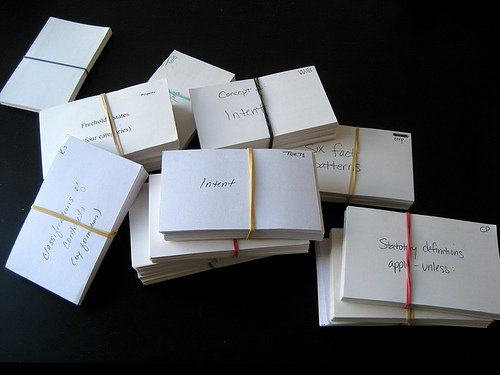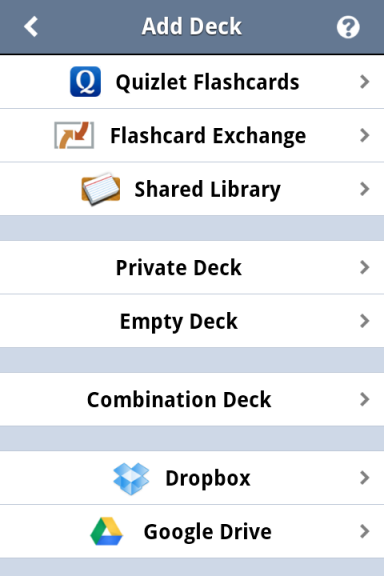 For some students, learning vocabulary is a breeze. For others, it’s like pulling teeth. Brains are simply wired differently and memorizing vocabulary will be easier for some than for others. The same is true for keeping your vocabulary. Just because you memorized words once for that final exam does not at all mean you will remember them. In fact, vocabulary probably slips away faster than other parts of the language, such as grammar and syntax. You will probably always remember that a subject is generally in the nominative case, and that an adverbial participle modifies a verb, but you may quickly forget what θηρίον means.
For some students, learning vocabulary is a breeze. For others, it’s like pulling teeth. Brains are simply wired differently and memorizing vocabulary will be easier for some than for others. The same is true for keeping your vocabulary. Just because you memorized words once for that final exam does not at all mean you will remember them. In fact, vocabulary probably slips away faster than other parts of the language, such as grammar and syntax. You will probably always remember that a subject is generally in the nominative case, and that an adverbial participle modifies a verb, but you may quickly forget what θηρίον means.
There are a few different strategies for keeping your vocabulary.
Read Your Greek New Testament
The first and most effective way (although not the most systematic way) is to simply read, read, read, and read some more Greek. As you read through the text you will encounter the vocabulary in their natural environment, i.e., natural use. This is without a doubt the best way to retain your vocabulary. In order to equip yourself for reading the Greek NT consistently, you will want to make sure you choose the right Bible. You can also use our Greek Reading Videos to help you keep reading through the Greek New Testament.
Get a Flashcard System
Without a doubt, you will not keep up with all your vocabulary by reading the Greek NT because you will not systematically encounter all the words you have learned, at least not consistently enough.
There are two types of flashcard systems, both of which use “interval spacing,” but in different ways. Interval spacing is the process by which you increase or decrease the amount of time between seeing a particular word, depending on whether you know or do not know the word. For example, if you have a daily stack and decide you know a card pretty well, you may move it to a weekly stack or file. The goal is to get every card to the “I really know this word” stack or file.
 The two different types of flashcard systems, which use interval spacing differently, are 1) physical flashcards and 2) programs or apps. With physical flashcards, you may have 3 or 5 stacks, from least well-known words (the first stack) to the stack with words like καί that you know you will never forget. If you use physical flashcards, try to be as organized and systematic as possible. Put a time limit on each stack for how often you will view the cards in that stack. If you ever miss a card, move it back to your daily stack, then as you get the word right, move it up the line of stacks so you see it less frequently.
The two different types of flashcard systems, which use interval spacing differently, are 1) physical flashcards and 2) programs or apps. With physical flashcards, you may have 3 or 5 stacks, from least well-known words (the first stack) to the stack with words like καί that you know you will never forget. If you use physical flashcards, try to be as organized and systematic as possible. Put a time limit on each stack for how often you will view the cards in that stack. If you ever miss a card, move it back to your daily stack, then as you get the word right, move it up the line of stacks so you see it less frequently.
Programs and apps are the other type of flashcard system. Some programs, such as Mounce’s FlashWorks, do not use interval spacing at all, but you can load vocabulary from any of Mounce’s chapters in his grammar. This is helpful as you work through the textbook, but for the long term it is not the most effective solution.
![]() The best app available that I am aware of is called Flashcard Deluxe (available for iOS and Android). It has a host of features and is incredibly customizable, allowing you to have multiple “sides” to each flashcard, including recording
The best app available that I am aware of is called Flashcard Deluxe (available for iOS and Android). It has a host of features and is incredibly customizable, allowing you to have multiple “sides” to each flashcard, including recording  your own sound-bite, adding pictures, adding multiple sides with text (perhaps you want a third side with a mnemonic device), and of course it has a very sophisticated interval spacing feature. It even allows you to change the factor by which the interval increases or decreases, which helps you to adjust the feature for your level of learning. Even better, you can connect to certain flashcard creation websites and download sets of flashcards that others have created and use them to study. People have already created flashcards for grammars such as Mounce, Croy, and Machen. There are even cards to Metzger’s Lexical Aids for Students of New Testament Greek, which gives words down to 10 occurrences.
your own sound-bite, adding pictures, adding multiple sides with text (perhaps you want a third side with a mnemonic device), and of course it has a very sophisticated interval spacing feature. It even allows you to change the factor by which the interval increases or decreases, which helps you to adjust the feature for your level of learning. Even better, you can connect to certain flashcard creation websites and download sets of flashcards that others have created and use them to study. People have already created flashcards for grammars such as Mounce, Croy, and Machen. There are even cards to Metzger’s Lexical Aids for Students of New Testament Greek, which gives words down to 10 occurrences.
If you are just learning Greek, or you never learned enough vocabulary, you could use the app to learn every Greek word that occurs 10x or more in the NT by studying the flashcards about 15-20 minutes a day for about half a year. I think by that point you will have learned all the words you need to read the NT pretty fluently.
If you already have a large bank of vocabulary memorized, then Flashcard Deluxe will help you keep them all memorized, as long as you spend a few minutes a day in the app (and if you do it daily, it’s really only a few minutes after you have established a good interval spacing for each card). Using this app in a disciplined manner is the most effective way I can suggest to quickly and easily learn and retain all the vocab you need for NT Greek.
Check out these awesome tips for keeping up with your Greek vocabulary! Share on XPress On!
Maintaining your NT Greek requires at least two practices: reading your Greek NT, and maintaining a disciplined flashcard system. However you do either of them, make sure you do them, and retaining your vocabulary should be a breeze.
Sign up here to receive our weekly email, Basic Greek for the Week, and check out our other “Keep Your Greek” posts here.

2 comments